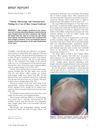 7 citations,
January 2013 in “BioMed research international”
7 citations,
January 2013 in “BioMed research international” Hair follicles and deer antlers regenerate similarly through stem cells and are influenced by hormones and growth factors.
 7 citations,
November 1987 in “Pharmacotherapy: The Journal of Human Pharmacology and Drug Therapy”
7 citations,
November 1987 in “Pharmacotherapy: The Journal of Human Pharmacology and Drug Therapy” Minoxidil can help thicken hair in some people with male pattern baldness, especially if used early and continuously.
 7 citations,
May 1978 in “International Journal of Dermatology”
7 citations,
May 1978 in “International Journal of Dermatology” Recent hair loss research shows some progress, especially in understanding male pattern baldness, but effective treatments for many types of hair loss are still lacking.
 6 citations,
October 2022 in “American journal of clinical dermatology”
6 citations,
October 2022 in “American journal of clinical dermatology” The review shows how to properly diagnose and treat the loss of eyebrow and eyelash hair.
 6 citations,
November 2013 in “International Journal of Radiation Biology”
6 citations,
November 2013 in “International Journal of Radiation Biology” Gamma-rays exposure during the resting phase of hair growth can damage hair regeneration and color in mice.
 6 citations,
July 2007 in “Aesthetic Surgery Journal”
6 citations,
July 2007 in “Aesthetic Surgery Journal” The document concludes that using autologous follicular unit implantation is a successful method to correct hairline deformities after facial rejuvenation.
 5 citations,
January 2019 in “Elsevier eBooks”
5 citations,
January 2019 in “Elsevier eBooks” Current therapies cannot fully regenerate adult skin without scars; more research is needed for scar-free healing.
 5 citations,
December 2015 in “Dermatologic Therapy”
5 citations,
December 2015 in “Dermatologic Therapy” Using a certain drug on the skin can help prevent hair loss caused by pulling on the hair.
 5 citations,
November 2015 in “International Journal of Radiation Biology”
5 citations,
November 2015 in “International Journal of Radiation Biology” Gamma-ray exposure can cause long-lasting damage to hair follicles, affecting hair structure and color.
 5 citations,
March 2015 in “Clinical and Experimental Dermatology”
5 citations,
March 2015 in “Clinical and Experimental Dermatology” Chemotherapy caused a woman's permanent hair loss and early menopause.
 4 citations,
May 2017 in “Pediatric Dermatology”
4 citations,
May 2017 in “Pediatric Dermatology” The study found that Short Anagen Syndrome results in short hair growth not due to hair fragility, and hair may grow longer after puberty.
 4 citations,
November 2014
4 citations,
November 2014 The skin protects the body, regulates temperature, senses touch, and makes vitamin D.
 3 citations,
October 2017 in “Journal of Cosmetic Dermatology”
3 citations,
October 2017 in “Journal of Cosmetic Dermatology” Dr. Muhammad Ahmad created a hair classification system to help improve hair restoration surgery outcomes.
 3 citations,
June 2017 in “International Journal of Radiation Biology”
3 citations,
June 2017 in “International Journal of Radiation Biology” Gamma rays did not change hair follicle density but increased white and hypopigmented hairs in mice.
 3 citations,
January 2016 in “Journal of cosmetology & trichology”
3 citations,
January 2016 in “Journal of cosmetology & trichology” Taking vitamins, minerals, and amino acids can improve hair strength and quality in people with Monilethrix.
 3 citations,
July 2012 in “Sokoto Journal of Veterinary Sciences”
3 citations,
July 2012 in “Sokoto Journal of Veterinary Sciences” As sheep age, their hair fibers and follicles grow larger and more organized, with no significant differences between males and females.
 3 citations,
January 2012 in “Elsevier eBooks”
3 citations,
January 2012 in “Elsevier eBooks” The document says that there are treatments for hair and nail diseases.
 3 citations,
October 1993 in “The Journal of Dermatology”
3 citations,
October 1993 in “The Journal of Dermatology” The review suggests limited treatments for common hair loss conditions, with potential for future improvements.
 2 citations,
June 2001 in “American Journal of Pathology”
2 citations,
June 2001 in “American Journal of Pathology” The document concludes that understanding how hair follicles naturally die and regenerate is important for insights into organ development and could impact health and disease treatment.
 1 citations,
May 2023 in “Curēus”
1 citations,
May 2023 in “Curēus” A man had a benign pilar cyst on his face, which is rare and was successfully removed by surgery.
 1 citations,
October 2022 in “Scientific reports”
1 citations,
October 2022 in “Scientific reports” Nestin identifies specific progenitor cells in hair follicles that can become outer root sheath cells.
 1 citations,
July 2020 in “Journal of cosmetic dermatology”
1 citations,
July 2020 in “Journal of cosmetic dermatology” A woman on immunosuppressants developed two rare scalp conditions, which improved with specific treatments.
 1 citations,
July 2018 in “Elsevier eBooks”
1 citations,
July 2018 in “Elsevier eBooks” Triple horizontal scalp biopsies are 98% accurate in diagnosing hair loss, better than single biopsies.
 1 citations,
January 2018 in “Elsevier eBooks”
1 citations,
January 2018 in “Elsevier eBooks” The skin's dermal layer contains true stem cells with diverse functions and interactions that need more research to fully understand.

research Hair
1 citations,
January 2016 in “Springer briefs in molecular science” The document suggests using safer, plant-based hair products instead of harmful synthetic ones.
 1 citations,
December 2015 in “The Egyptian Journal of Histology”
1 citations,
December 2015 in “The Egyptian Journal of Histology” Hypothyroidism harms rat skin, but topical triiodothyronine may help improve it.
 1 citations,
July 2015 in “British Journal of Dermatology”
1 citations,
July 2015 in “British Journal of Dermatology” Imiquimod improved skin pigmentation in most patients with xeroderma pigmentosum and may prevent further skin cancer, but some treatments can have side effects.
 1 citations,
October 2012 in “Elsevier eBooks”
1 citations,
October 2012 in “Elsevier eBooks” Skin stem cells can help improve skin repair and regeneration.
 1 citations,
January 2011 in “International Journal of Trichology”
1 citations,
January 2011 in “International Journal of Trichology” Hair follicle stem cells have significant potential for treating various disorders.
 1 citations,
May 2004 in “Journal der Deutschen Dermatologischen Gesellschaft”
1 citations,
May 2004 in “Journal der Deutschen Dermatologischen Gesellschaft” The meeting presented new findings on hair stem cells, pigmentation, genetics, and modern hair treatment techniques.






























